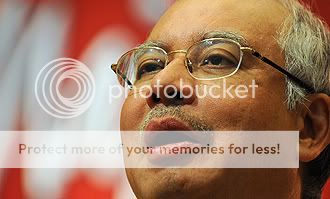All eyes will be on Najib’s cabinet choices

Would Najib assemble a cabinet to win party votes or one to win the next general election, and the two seem to be mutually exclusive.
However Najib’s immediate task to assemble a Cabinet is more important. Compared to the cabinet before dissolution, he has 11 vacancies to fill. Seven members of the previous Cabinet did not contest the parliamentary elections and three were defeated.
By ZB Othman, FMT
A week is a long time in politics, but for Malaysians it has seemed a lot longer following the 13th general election (GE13).
The final score was Barisan Nasional (BN) — 133 and Pakatan Rakyat (PR) — 89.
Usually the winners would be busy cobbling a cabinet together and the losers would be licking their wounds and sitting in front of the drawing board to scheme a plan for the next one.
However, the “most serious threat” to the BN since Merdeka has turned matters on its head. Losers PR is still planning protests, claiming that the election was stolen from them.
On the other side, winners BN seems unsure how to handle a victory in which it retained power, by a comfortable margin, in parliament but lost the coveted two-third majority.
For Prime Minister Najib Tun Razak, his work has just begun.
Najib’s long-term work would be to reconcile a seemingly divided nation after the polls and to ensure BN’s election promises get delivered in the next five years — a monumental task in itself with a bill that has been estimated at about RM225.6 billion by bean counters.
However Najib’s immediate task to assemble a Cabinet is more important. Compared to the cabinet before dissolution, he has 11 vacancies to fill. Seven members of the previous Cabinet did not contest the parliamentary elections and three were defeated.
How he fills these vacancies is very important, not least because he will be scrutinised by members of his own Umno party who will vote whether he will stay as president in the next general assembly later this year.
The question is already being asked, would he assemble a cabinet to win party votes or one to win the next general election, and the two seem to be mutually exclusive.
In this, Najib is faced with precedents in Umno set in 1970 when Tunku Abdul Rahman stepped down after losing many seats in the 1969 general election and in 2009 when Tun Abdullah Ahmad Badawi, who was the first prime minister to fail in securing a two-thirds majority, made way for Najib.
Since then, Najib has done a lot to correct some of the shortcomings that have driven young voters away from BN.
Some of these steps, like his 1Malaysia branding and the abolition of the hated Internal Security Act have been successful in putting a new face on BN and Umno as a more tolerant organisation.
Other steps, however, such as the rolling back of Malay privileges and spending to raise the lot of the poor has been treated with suspicion.
Retribution politics
It is telling that while Najib has called for national reconciliation, there are some in BN who are still bent on punishing the voters who did not support them.
On Saturday newly appointed Terengganu Mentri Besar Ahmad Said said areas where BN lost in the state would not have the benefit of having the services of local development officers nor state funded affordable housing projects. It is back to the day of retribution politics that is losing traction now.
Someone who lost but has not blamed voters is BN’s Saifuddin Abdullah, who is an Umno Supreme Council member. Saifuddin admitted that his loss was due to Chinese votes but added that his analysis showed that he also lost because some Malay votes did not come his way.
“Records show that some 3,389 Umno voters stayed away on election day, and if you do the maths, it could have easily offset the 1,070 votes I lost to my opponent,” he said.
“More importantly I think the trend is that a large portion of voters have moved away from development-based aspirations towards democratic aspirations.”

